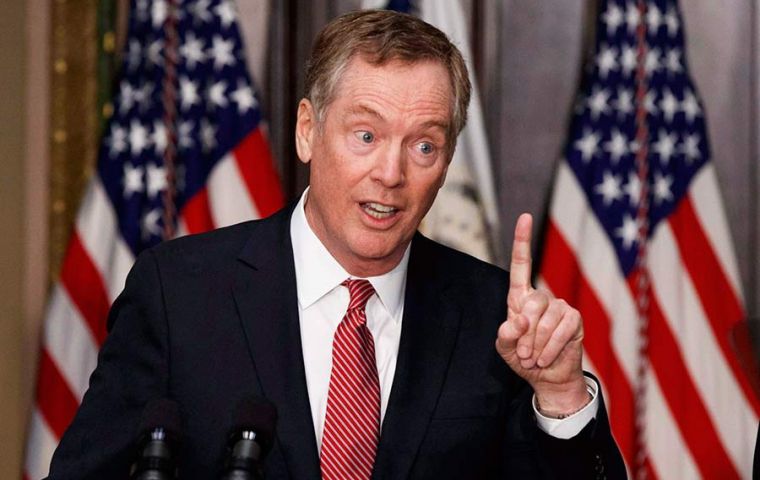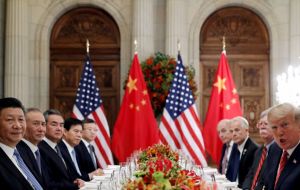MercoPress. South Atlantic News Agency
Trade war: US and China set to discuss intellectual property on Monday
 Lighthizer has been a strong proponent of pushing China to make reforms in unfair trade practices such as “stealing intellectual property”
Lighthizer has been a strong proponent of pushing China to make reforms in unfair trade practices such as “stealing intellectual property”  The two sides are trying to hammer out a deal ahead of March first deadline when U.S. tariffs on US$ 200 billion worth of Chinese imports are scheduled to increase
The two sides are trying to hammer out a deal ahead of March first deadline when U.S. tariffs on US$ 200 billion worth of Chinese imports are scheduled to increase United States negotiators are preparing to press China next week on longstanding demands that it reform how it treats American companies’ intellectual property in order to seal a trade deal that could prevent tariffs from rising on Chinese imports.
A new round of trade talks begins in Beijing on Monday, after the most recent set of negotiations concluded in Washington last week without a deal and with the top U.S. negotiator declaring that a lot more work needed to be done.
A White House official said on Friday that preparations were under way and the talks would continue to focus on pressing Beijing to make structural reforms.
The White House announced a timeframe for the Beijing talks in a statement. It said lower-level officials will kick off the meetings on Monday, led on the American side by Deputy U.S. Trade Representative Jeffrey Gerrish. Higher principal-level talks will take place Thursday and Friday with U.S. Trade Representative Robert Lighthizer and Treasury Secretary Steven Mnuchin.
Lighthizer, named by Trump to spearhead the process after agreeing a 90-day truce in the trade war with Beijing, has been a strong proponent of pushing China to make such reforms and end what the United States views as unfair trade practices including stealing intellectual property and forcing U.S. companies to share their technology with Chinese firms. China has denied it engages in such practices.
“The United States is a great producer of technology, and innovation, and know-how, and trade secrets. And we have to operate in an environment where those things are protected,” Lighthizer said last week after talks at the White House.
The two sides are trying to hammer out a deal ahead of the March 1 deadline when U.S. tariffs on US$ 200 billion worth of Chinese imports are scheduled to increase to 25% from 10%.
China’s ambassador to the United States, Cui Tiankai, said in Michigan on Friday that a “zero-sum game” mindset was destructive to China-U.S. ties, the state-run news agency Xinhua reported.
Chinese and U.S. companies should compete as well as cooperate with each other, Cui said. “The real story in business is not that black and white,” the report quoted him as saying.
Trump said on Thursday he did not plan to meet with Chinese President Xi Jinping before that deadline, dampening hopes that a trade pact could be reached quickly.




Top Comments
Disclaimer & comment rulesCommenting for this story is now closed.
If you have a Facebook account, become a fan and comment on our Facebook Page!